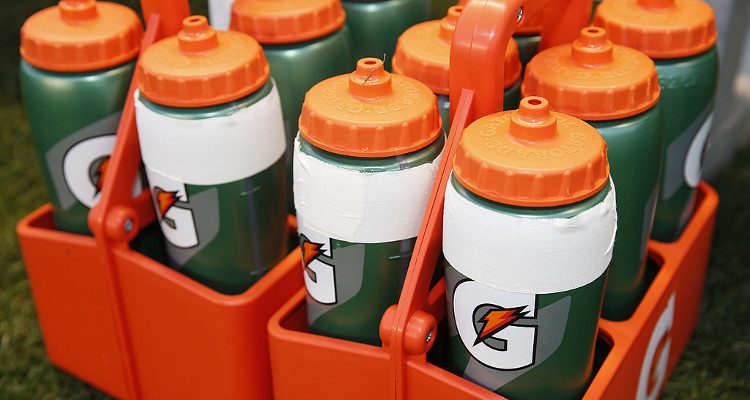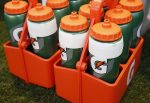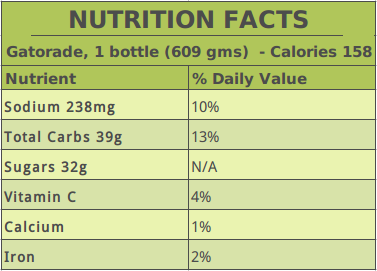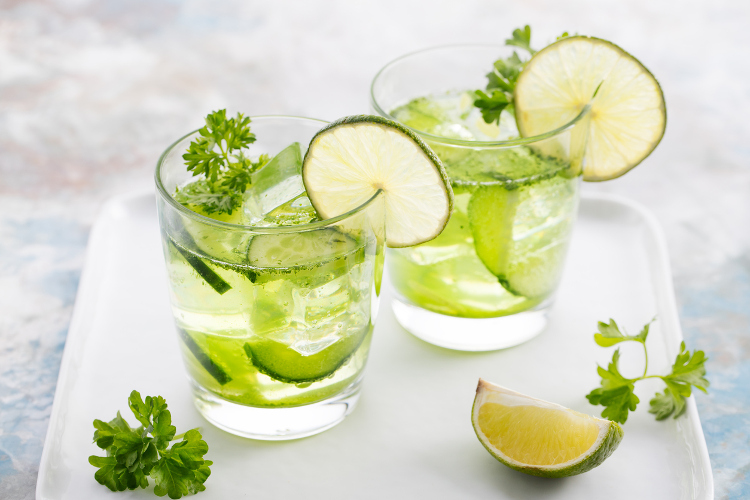
It’s a set of questions that you might hear often at the gym or on the field. Is Gatorade good for you? Are any sports drinks good for you? Is water just as good as Gatorade for rehydration? To be fair, these are very valid questions.
While they may not be super expensive, Gatorade and other sports drinks do cost money; and it adds up in the long run. Water, essentially, is free. If water can do the same thing as Gatorade, why buy Gatorade? We’ve decided to get down to the bottom of this question.
We’ve done some research, looked up Gatorade’s nutrition stats, and broken it down for you. What does Gatorade do? We’ve got your answers below.
Gatorade Nutritional Facts and Ingredients
In order to figure out what Gatorade does for you, you should know what goes into it. The following stats and ingredients are for a bottle of regular fruit-flavored, “thirst quencher” Gatorade.
In terms of actual ingredients, a typical bottle of Gatorade contains the following: water, sucrose, dextrose, citric acid, natural flavor, salt, sodium citrate, monopotassium phosphate, modified food starch, and glycerol ester of wood rosin.
Depending on the flavor of the Gatorade, it may also contain different coloring agents. Now that you know what goes into Gatorade, it’s time to deal with the big question: Is Gatorade healthy?
Is Gatorade Bad for You? Benefits of Gatorade
Is Gatorade bad for you? Like many food products, especially those geared towards professional athletes, the answer is complicated. Gatorade is designed as a sports drink to help replenish minerals and nutrients that are lost during a heavy workout or a game.
Part of the reason it has all that sodium is to replace it when it’s left your body during a rather sweaty workout.
1. Electrolytes
Gatorade is good at replacing electrolytes. Electrolytes are essential to the functioning of the human body. These minerals take on a positive or negative charge when dissolved in our body’s fluid, allowing them to send electrical signals that regulate important functions throughout.
Electrolyte balance is especially good news for your kidneys as they need these minerals in order to function properly. For this reason, Gatorade is sometimes used by those with an illness like the stomach flu that causes vomiting or diarrhea as it will help you replace the electrolytes that leave due to those two symptoms.
Please note, however, if you are suffering from a virus or bacterial infection that causes serious vomiting and diarrhea, Gatorade is not ideal. Consult a doctor, who may prescribe something like an oral rehydration kit to give you the best balance of nutrients.
2. Endurance
Gatorade may also be good for increasing endurance in cyclists. In an April 2009 study for Applied Physiology, Nutrition and Metabolism, it was noted that drinking Gatorade during long periods of cycling helped preserve the leg muscles in the cyclists during five different trials.
This same effect could also work with runners, soccer players, hockey players and any other athletes involved in sports where the leg muscles are used for extended periods.
3. Use Caution
Keep in mind all of these benefits (with the exception of helping out when you have the stomach flu) revolve around intense exercise. Essentially, you have to lose the minerals, nutrients, and electrolytes if you want to use Gatorade to replace them.
Therefore, a major drawback of the drink is its popularity among children and the inactive crowd. As noted in the table above, a 106-gram bottle of Gatorade contains 158 calories and 32 grams of sugar.
Excess consumption of the sports drink may contribute to childhood diabetes and obesity. Children should never use Gatorade or any other sports energy drinks in this manner. Water and fresh fruit are healthier and more effective solutions after physical activity.
But how does Gatorade stack up to water for adults who engage in strenuous physical activity for extended periods of time? Is it better to use water over Gatorade in certain situations?
Water vs. Gatorade: What Should You Use and When?
Most of us are taught from a young age that water is to be used for hydration. If you’re thirsty, have a glass of water. If you’ve been running around the yard all day with the neighborhood kids, have a glass or two of water. Can Gatorade be more effective in certain situations? Is Gatorade ever good for you?
As we previously mentioned, Gatorade is designed to replenish numerous electrolytes lost after a strenuous workout. Water doesn’t do that. Water does replenish fluid, but not minerals such as calcium, magnesium, chloride, phosphate, potassium, and sodium—all electrolytes. Sodium is important as it will help your body direct fluid to the right places where it is needed.
That being said, Gatorade comes with added sugar and a number of coloring agents that can be harmful to the body. There are better natural alternatives that can rehydrate and replace your lost nutrients.
The best way to think of it is this: Unless you are a professional athlete or bodybuilder, water will probably do just fine for you. Gatorade was developed by a team of researchers at the University of Florida to combat heat-related illnesses of players on the field.
So if you’re an average person that just cut the grass for 20 minutes, you probably haven’t lost that much in the way of minerals and water will do for the amount of work you’ve put in.
For any liquid, it’s also a good idea to sip over the course of your activity as opposed to chugging the beverage all at once. Chugging sends mixed singles to your body about what it needs and where.
Natural Alternatives to Gatorade & Their Recipes
Luckily, if you want the benefits of Gatorade, there are more natural alternatives that can help restore minerals and electrolytes that are safe for kids. Coconut water, for example, can help with electrolyte replacement. There are a number of options that you can make at home.
1. Simple Coconut Sports Drink
Ingredients:
- 1 quart of coconut water
- 1/8 or 1/4 teaspoon high quality salt
- 1 teaspoon calcium magnesium powder
- 1/4 cup or more of freshly pressed juice (optional) Orange, grape, apple, pineapple, are all acceptable.
Instructions:
Warm the coconut water to help better dissolve the rest of the ingredients. First add the sea salt and calcium magnesium powder. Add the juice, if using. If need be, add 1 tbsp. of a natural sweetener like honey to taste. Refrigerate.
2. Lemon Lime Sports Drink
Ingredients:
- 1/4 cup freshly squeezed lemon juice
- 1/4 cup of freshly squeezed lime juice
- 1 ½ to 2 cups fresh water
- 2 tablespoons natural sugar or honey, to taste
- 1/8 teaspoon of sea salt
Instructions:
Place all ingredients into a blender. Blend until all ingredients have mixed together. Refrigerate until needed.
Gatorade: Drink Only When Necessary
As demonstrated, Gatorade sports drinks can be beneficial to you under the right circumstances.
Gatorade can be effective for professional athletes and those who regularly engage in high-intensity workouts for extended periods of time (at least five days a week). Gatorade may help also replenish fluids and electrolytes after a bad bout of stomach flu that can cause vomiting and or diarrhea.
But it should only be consumed in the absence of healthy, natural alternatives. Plain water or water infused with fresh fruit will get the job done just as well with none of the sodium, sugar, or calories that come with Gatorade.
Related:
- Understand the Difference between Powerade & Gatorade
- Is Smartwater Good for You?
- Top 20 Foods with Electrolytes
- Cleanse Drinks: 10 Detox Drink Recipes for Effective Cleansing
Sources:
“Sports drink, PEPSICO QUAKER GATORADE, GATORADE, fruit-flavored, ready-to-drink thirst quencher,” SELF Nutrition Data; http://nutritiondata.self.com/facts/beverages/9233/2
Moran, A., “Gatorade’s Mystery Ingredients,” One Result, November 27, 2011; http://www.oneresult.com/articles/nutrition/gatorade%E2%80%99s-mystery-ingredients















